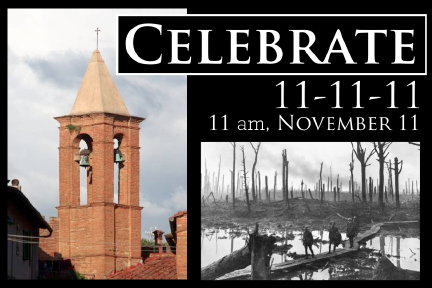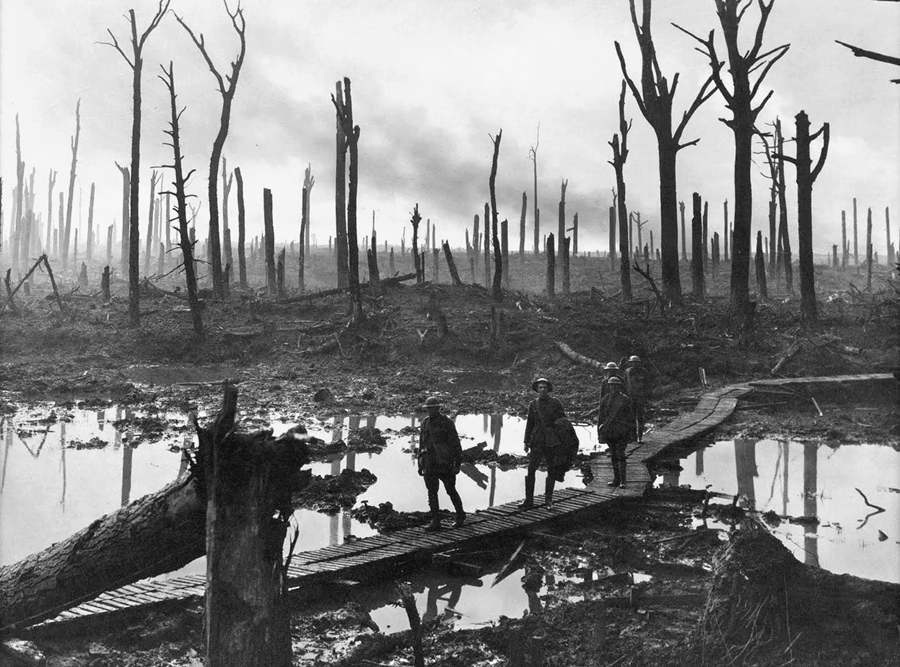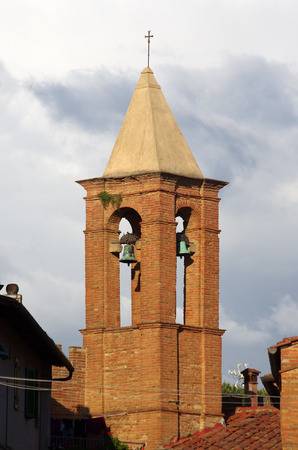World War One ended with armistice 100 years ago next Sunday morning at 11:00 am, November 11, 1918; 11-11-11.
How about joining the celebration of this great event by having your local church ring its bells 21 times at 11:00 am? Think it a sign of peace and hope. There are six churches covered in the book “Sappington-Concord: A History.” There are many more in the Sappington-Concord area. Is one of those churches in your neighborhood? Why don’t you go ask them this week if they are planning to ring their bells on Sunday morning at 11:00 am as a sign of peace and hope?

Celebrate the armistice of World War I, 100 years ago on November 11 at 11:00 am, 1918. Ring the bells at your place of worship for peace and hope.
 WWI Commission Announces ‘Bells of Peace’ for Armistice Centennial. See the WWI Commission website for more on this commemoration
WWI Commission Announces ‘Bells of Peace’ for Armistice Centennial. See the WWI Commission website for more on this commemoration
Bell of Peace: Participation App
Armistice thoughts
The following are some personal thoughts on the bell ringing to commemorate World War I armistice. It is an expansion of the idea the WWI created the world we live in today. By Stephen Hanpeter
World War I shocked the world. It is still shocking today. It stands only next to the Holocaust and the atomic bombings of Japan. World War I was unexpected. Men and nations were in high spirits as they joined the fray. It was hard for them to comprehend the slow slide to trench warfare, stalemate, slaughter. It got more incomprehensible, and still more incomprehensible. It is hard even today for us to comprehend 100 years later. It was killing with industrial effectiveness. The numbers were staggering. The misery was relentless. Lost limbs and shell shocked minds lived on with the survivors. The insult of the war remained in all hearts, in all peoples.
World War I removed optimism from the world, and replaced it with many new kinds of “isms.” It brought the big time isms of communism, fascism, totalitarianism, socialism, and finally existentialism. The war made isolationism an a political choice to be debated. It made secularism more popular. It badly hurt colonialism and monarchies. The war created the seedbed for eventual Islamic militarism.
World War I fractured the maps of Southern Europe, Eastern Europe, and the Middle East. The war brought the creation of the League of Nations. Then it brought the downfall of international cooperation. World War I set the scene for a World War II.
World War I shook up societies across the world. It sped up the movement to self determination for many peoples. It raised the expectations of women and minorities. It drove the economically underprivileged to extremes. Painters, writers and musicians showed a light into the darkness of man. They brought on abstractionism, atonality, the disjointed. The brokenness could not be made whole.
World War I was hoped to be the war that ended all wars. It is our moment Sunday morning to remember that hope, even if just for a moment. On November 11, at 11:00 am in 1918, bells rang out signaling the start of the armistice. They were bells of joy. Let us feel the joy again and let us pray for peace as we hear the bells ring out again.
Three WWI poems
http://www.bridgeboymusic.com/ad1918/ww1poetry.htm
Suicide in the Trenches
Siegfried Sassoon
I knew a simple soldier boy
Who grinned at life in empty joy,
Slept soundly through the lonesome dark,
And whistled early with the lark.
In winter trenches, cowed and glum,
With crumps and lice and lack of rum,
He put a bullet through his brain.
No one spoke of him again.
You smug-faced crowds with kindling eye
Who cheer when soldier lads march by,
Sneak home and pray you’ll never know
The hell where youth and laughter go.
Grass
Carl Sandburg
Pile the bodies high at Austerlitz and Waterloo.
Shovel them under and let me work—
I am the grass; I cover all.
And pile them high at Gettysburg
And pile them high at Ypres and Verdun.
Shovel them under and let me work.
Two years, ten years, and passengers ask the conductor:
What place is this?
Where are we now?
I am the grass.
Let me work.
The Veteran
May 1916
Margaret Postgate Cole
We came upon him sitting in the sun
Blinded by war, and left. And past the fence
There came young soldiers from the Hand and Flower,
Asking advice of his experience.
And he said this, and that, and told them tales,
And all the nightmares of each empty head
Blew into air; then, hearing us beside,
“Poor chaps, how’d they know what it’s like?” he said.
And we stood there, and watched him as he sat,
Turning his sockets where they went away,
Until it came to one of us to ask “And you’re how old?”
“Nineteen, the third of May.”
Religion and World War One
https://politicaltheology.com/how-the-first-world-war-helped-give-rise-to-political-theology-ramon-luzarraga/
How the First World War Helped Give Rise to Political Theology – Ramón Luzárraga
http://www.robertmprice.mindvendor.com/art_major_theo_great_war.htm
MAJOR THEOLOGICAL ISSUES BEFORE THE GREAT WAR
https://www.thinkingfaith.org/articles/great-and-holy-war-how-world-war-i-changed-religion-forever
https://encyclopedia.1914-1918-online.net/article/the_churches
https://en.wikipedia.org/wiki/Reinhold_Niebuhr
The Great and Holy War: How World War I changed religion forever – Jenkins
WWI Christmas Truce
See teh SCHS web page on the WWI Christmas Turce



